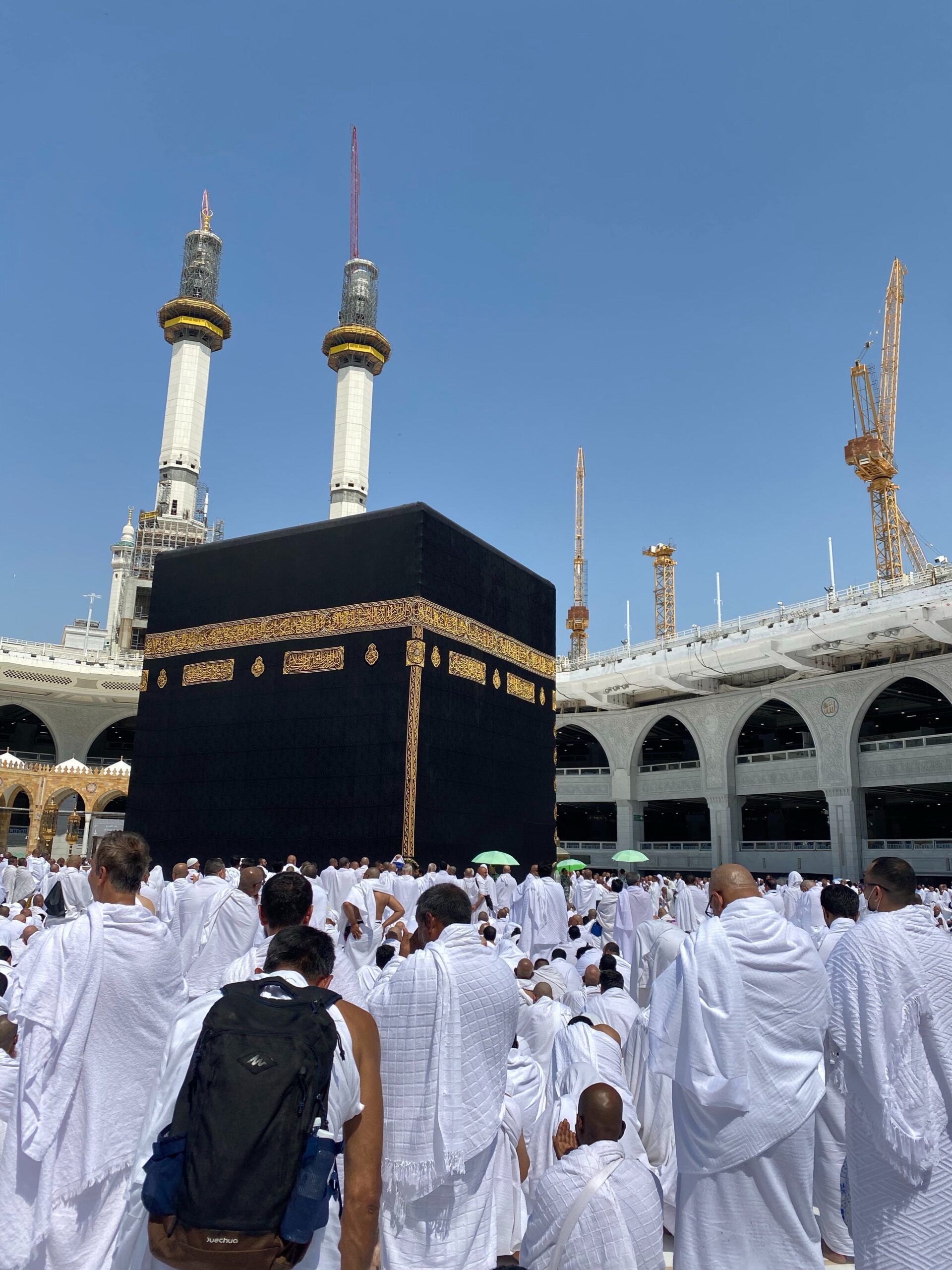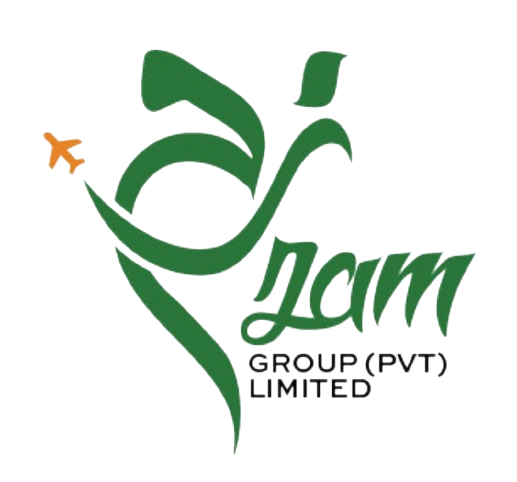Pak Saudi Najam
Pak Saudia Najam (Pvt) Ltd. is proud to extend its renowned services to the Holy Cities, catering specifically to the needs of pilgrims embarking on the sacred journey of Umrah. With our strong presence in the leisure and holiday markets, our expertise and commitment to offering exceptional travel-related products and services to ensure a seamless and fulfilling experience for our valued customers—the Guests of Allah Al-Mighty.
Included in every package are comprehensive services to alleviate the burden of logistics and enhance the overall journey. From Visa Formalities to Airport meet-and-assist Services, Airport to Haram Transfers, and Booking and Reservation in Hotels/Apartments of your choice (subject to availability), we ensure that every aspect of your Umrah experience is taken care of with utmost attention to detail.

Our Services
Our services commence from the time you decide to perform your religious obligations, in helping you understand the Hajj/Umrah process and customizing an itinerary, till the time you depart from the Holy Land – satisfied and content with the experience provided by Pak Saudi Najam (Pvt) Ltd. International Tours Operators: For this objective and to provide an appropriate and smooth stay, the company has invested and established contracts with 5 stars, 4 star and 3-star hotels that are characterized by their proximity or nearest to the two Holy mosques in Makkah Mukarama and Madina Munawara
Hajj Visa Requirements
- A single, recent color passport-size photograph with a white background is required.
- Application form filled in with black ink pen or printed.
- A non-refundable roundtrip ticket with confirmed reservations.
- Proof of vaccination.
- Original passport for scanning.
- Four pictures 3x4 cm (light blue background).
- Blood Group.
- Mobile number / Landline number.
- Nominee name (in case of emergency during travelling, must be adult/relative.

Hajj & Umrah Services
We specialize in Hajj, Umrah Travel & Ticketing services tailored to your need!
Hajj Group
Umrah
Tickets
Halal Tours
HAJJ facilities
Pre-Hajj Meet Up
Get to know each other and held ameeting with all the Hajjis
Buffet Meals
We facilitate with visa documentation and services
Visa Acquisition
We facilitate with visa documentation and services
Meet & Assist
A dedicated team to assist and guide
Luxury Transport
We offer luxury busses and private vehicle
Sofa Mattress in Mina
Premium quality sofas and mattress
Why Choose Hajj International
How It Works
Begin by researching the specific requirements for the visa you are applying for. Different visas have different criteria and supporting documents.

Visa Application
Complete the visa application form accurately and thoroughly. Pay attention to details and provide truthful information if additional information is requested.

Documentation
Which may include passport copies, passport-sized photos, proof of financial means, travel itineraries, and any other documents required by the issuing authority.

Pay Any Applicable Visa Fees
Different visas may have varying processing fees, and the payment method may differ depending on the embassy or consulate.
What Our Clients Say
The proximity of the 5-star hotel to the Holy Mosques in Makkah and Madina made the entire experience even more special.

Pak Saudia Najam(Pvt) Ltd. orchestrated a seamless Hajj journey, guiding us through the sacred rites with precision. Proximity to the holy sites and meticulous planning made this pilgrimage a truly spiritual and unforgettable experience.
John Doe

Pak Saudia Najam (Pvt) Ltd. tailored an executive-level Hajj experience, ensuring my spiritual journey was complemented by exclusive accommodations and personalized services. The fusion of comfort and reverence made my pilgrimage with Faris truly exceptional.
Jessica Smith

Choosing Pak Saudia Najam (Pvt) Ltd. for my Hajj was a decision well-made. From a streamlined visa process to peaceful accommodations, they facilitated a journey filled with devotion and comfort. Their commitment to service elevated the significance of this sacred pilgrimage
Steve Rogers
Hajj FAQ'S
The significance of the Hajj rituals lies in their ability to guide pilgrims towards a state of spiritual purity known as "ihram." This sacred state serves as a symbolic departure from materialistic symbols, prompting pilgrims to relinquish worldly comforts and redirect their focus inward. By shedding external adornments and embracing simplicity, pilgrims are encouraged to delve into the depths of their inner selves rather than being preoccupied with outward appearances. The rituals, therefore, act as a transformative process, testing the pilgrims' patience and tolerance. This spiritual journey challenges individuals to rise above the allure of worldly pleasures, fostering personal growth and a deeper connection with their faith.
On the 9th of Dhul Hijjah, just before noon, pilgrims converge upon Arafat, a desolate and flat expanse. Here, they engage in a contemplative vigil, offering supplications, seeking repentance for their sins, and imploring the mercy of Allah. Islamic scholars deliver a sermon during this period, which extends from noon until sunset, commonly referred to as wuquf, marking one of the pivotal rites of Hajj. Pilgrims collectively perform the noon and afternoon prayers at Masjid al-Namirah. It is imperative for the pilgrim to spend the afternoon at Arafat; failure to do so renders the Hajj invalid.
Hajj is the major pilgrimage undertaken by Muslims to Mecca, occurring in the last month of the Islamic calendar. It is obligatory for all Muslims who can afford to do so to perform Hajj at least once in their lifetime, making it one of the Five Pillars of Islam. There are three forms of Hajj: Tamattu, Ifraad, and Qiran. Here, we focus on the Tamattu form, which Prophet Muhammad (peace and blessings be upon him) encouraged. The process involves:
- Preparation and Intention: Make the niyyah or intention before beginning Hajj.
- Entering the State of Ihram: Enter the state of Ihram, signifying ritual purity.
- Performing Umrah in Makkah: Start with Tawaf (circumambulation around the Kaaba) and Sa'i (walking and running between Safa and Marwa hills). Men clip or shave their hair, while women trim it to fingertip length, marking the completion of Umrah.
- Resting and Praying: Remain in Makkah for the rest of the month, engaging in sincere worship. Hajj officially begins on the 8th of Dhul Hijjah.
- Re-entering the State of Ihram: Purify oneself and re-enter the state of Ihram on the 8th day.
- Arriving at Mina: Pray obligatory prayers, shorten the four-unit prayers to two, and spend the night, preparing for the next day.
- Day of 'Arafat: Go to the plains of 'Arafat, recite Istaghfar, and make supplications.
- Arrival in Muzdalifah: After sunset, leave 'Arafat for Muzdalifah, perform Maghrib and 'Isha Salah, and collect pebbles for the "stoning the devil" ritual.
- Rami and Hady: On the 10th of Dhul Hijjah, perform the Hady and initiate the first day of "stoning the devil."
- Qurbani and Eid al-Adha: On the same day, offer Qurbani or sacrifice.
- Shaving the Head: After the Hady, men shave or trim their hair; women trim to fingertip length, and Ihram is lifted.
- Tawaf al-Ifadha and Saai': Return to Makkah, perform Tawaf al-Ifadha, and another circuit of Saai'.
- Second Day of Rami: On the 11th of Dhul Hijjah, carry out the second day of "stoning the devil."
- Spend Night in Mina: After the second Rami, return to the camp in Mina and engage in worship.
- Third Day of Rami: On the afternoon of the 12th of Dhul Hijjah, conclude the "stoning the devil" ritual.
- Tawaf al-Wida: Perform Tawaf al-Wida before leaving the boundaries of the Haram.
Mina is a valley encircled by mountains, where pilgrims reside on the nights of the 8th, 11th, and 12th of Dhul Hijjah during Hajj. Occasionally, some may also spend the night of the 13th in Mina. The significance of Mina extends to the stoning ritual, as it is home to the three stone pillars of Jamarat.
Staying in Mina is crucial because pilgrims dedicate an entire day and night within the tents situated there, known as Layali al Tashriq. During this period, pilgrims engage in various acts of devotion, including reading the Holy Quran, offering prayers, worshipping Allah SWT, and participating in Zikr. Additionally, they attend Islamic lectures, making their stay in Mina a spiritually enriching experience that aligns with the core rituals of Hajj.





